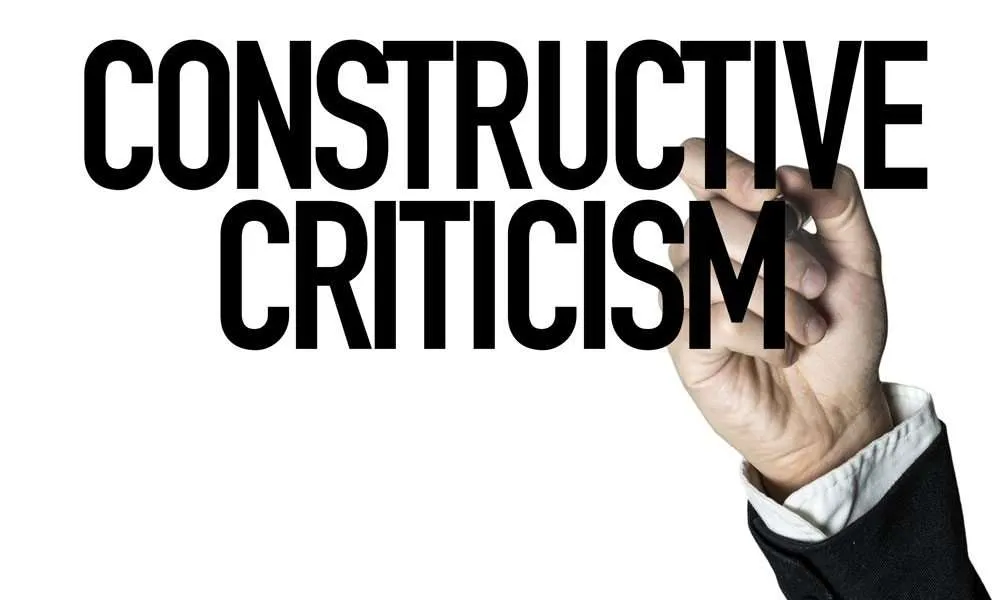Not everyone likes to be criticized, especially Nigerians. But, when it comes to the workplace, you have to give and take criticism.
Which criticism is it going to be? Destructive or constructive? To have a great work environment, constructive criticism is your go-to.
Although giving and taking practical constructive criticism is fundamental to every professional development, it is important to know that it can be helpful or detrimental when presented properly or ignored. It largely affects managers, employees and, in some cases, the clients, which makes it a delicate subject of the workplace.
So how can you learn to take criticisms well and improve at delivering to others?
This article will cover all you need to know about constructive criticisms at the workplace, effective strategies for implementation and steps to take.
Table of Contents
What is Constructive Criticism?
Constructive criticism is a useful method of critiquing that gives explicit, significant directions. It focuses on a person’s work (employee in this case) rather than anything personal to such a person. In other words, it suggests concrete ways for professionals in or on the job or organization to improve significantly.
It is also a form of feedback that focuses on delivering critique and feedback constructively and positively to improve performance or behaviour.
Constructive criticism can be employed by leaders and managers for employees to improve, set and achieve work goals. When you apply various strategies, your employees benefit from actionable feedback.
As much good as it is displayed, when it isn’t properly given or taken, problems may arise. Hence the need to know both how to give and take.
How to Give Constructive Criticism at Work
Constructive criticism becomes accepted when it is timely, detailed, clear, actionable and specific.
Let’s take a look at some key tips for giving constructive criticism:
-
Use “I” statements
“I” statements express opinions and help to focus on the situation rather than the person in question. A statement should begin with “I feel…” or “I believe…” rather than “You should have…” or “You did..”
With this, feedback can feel less personal. By beginning every sentence with “I”, it shows you are mainly sharing your opinion, views, and thoughts rather than objective facts. This can help reduce the feelings of personal defensiveness that comes with most criticism and make the entire feedback process more productive.
Example of an “I” Statement
“I think the content will be more precise with fewer words. Reading most sentences with many words wasn’t easy for me. How about you reduce the number of words per sentence for readability and easy engagement?”
-
Include positive comments when appropriate
Positive feedback is needed and essential for constructive criticism. It doesn’t have to be negative comments only. Providing these positive comments helps you spend time honing your employees’ strengths and strengthening their weaknesses as a leader. This serves as a booster in many cases and is of great help.
Example of positive constructive criticism
“Your approach to this task was impressive! You did a great job working with the factors provided and came up with a better solution than I have ever thought. This will help the organization a bunch!”
-
Provide actionable feedback
As the goal of constructive criticism boils down to identifying what the employee needs to work on, to make criticism a great one requires ideas and the next steps that the person can take to develop their skill further.
Giving actionable feedback alongside constructive criticism makes what to improve clear and straightforward.
Example of actionable constructive criticism
“I think you handled the client’s last-minute project well despite your challenge. Have you seen how I used Trello to organize everything? I believe Trello will be a perfect paraphernalia for our next project.”
-
Give timely feedback
It is necessary to give constructive criticism relatively after the action occurs. That way, the scenario is fresh. On the other hand, if you wait too long, the feedback may become less relevant.
Example of a Timely Feedback
“I am following up on your presentation to executive stakeholders last Saturday. Your slides were clear, but I would have liked more time for Q&A. Next time, you could send over some pre-reading to skip the first few slides.”
-
Be specific and respectful
Constructive criticism means providing a critique of someone’s performance by acknowledging both the positive and negative aspects of their work, along with the appropriate steps to improve- Trish Sammer, SCMM Trello.
Transparency and being specific in your constructive criticisms are crucial to employees’ growth and overall performance. After all, one must know what’s wrong to address it properly.
To get the best result, you must let your employees know the issue by giving specific illustrations of these questionable behaviours and actions respectively and in time. Get to the point quickly to avoid confusion.
Example of a Specific and Respectful Constructive Criticism
“You were always proactive in the projects you take on but I’ve noticed that you have taken more of a backseat in the last few projects. Has something changed over the last few months? Perhaps we could discuss future projects that you would be more passionate about.”
Read Also: 8 Signs You’re in a Toxic Workplace
How to Take Constructive Criticism at Work
We have looked into giving constructive criticism. How about taking feedback instead of giving it?
Accepting constructive criticism and not getting defensive can be difficult. Even though you conceptually know the person is giving feedback to help you, it is human nature to feel a little defensive when receiving criticisms, even when it is helpful.
These five steps will help you become a pro at receiving criticism:
-
Listen to understand, not to respond
When given constructive criticism, you must listen without giving a defensive response. It should be clear that the person is giving feedback to help. Instead, listen with an open mind.
-
Avoid immediate reaction
Feedback can engage a fighting response and turn a helpful session into a furious and emotional challenge. Before responding, take a deep breath and resist every urge to argue, react and respond irrationally.
-
Connect feedback to your role, not your person
Most times, feedback feels personal because we think we are being criticized. But in a professional setting, feedback or constructive criticism is based on your role. Every feedback can help you improve your work and should not be taken personally.
-
Be reminded that constructive criticism can help you improve
Once you establish that every criticism is for you to improve, you get better at receiving them. If you don’t see any coming, be reminded that every criticism is being offered with your best interest at heart.
-
Deconstruct the feedback by asking questions
It is perfect to ask questions and brainstorm with the “feedback giver” on possible ways to help you improve. However, this still doesn’t allow you to challenge the feedback. To get the best from the feedback and work on it, a follow-up meeting to chat about how you can improve is fine too.
Read Also: How to Develop or Improve Company or Workplace Culture
Benefits of Constructive Criticism
As an integral part of an organization’s method of critiquing, constructive Criticism builds trust and provides an opportunity for parties to it to grow.
Hers are a few benefits of embracing it.
-
Room for improvement
A useful and timely criticism can be the angel to knock you out of a flop as a good professional, criticisms for you should be a gain and not just for you to respond as though it’s an unfair attack.
Criticisms like this are about improvement in the slightest way. Constructive criticism provides timely, useful mechanisms for skill improvement, motivation, and support. You should embrace it!
-
Lowers stress level
Some people continually fret about what others will think about their work and whether or not their opinions will match.
However, training your mind to be receptive to others’ opinions on your work helps you maintain a more peaceful state of mind and greatly lowers stress. In this case, you will be able to focus more on the areas of improvement, which will help you get the work done better and faster.
In other words, embracing constructive criticism will decrease your stress level.
Read Also: How to Promote Team Bonding at Work
-
Enhances productivity
Constructive criticisms, when received, will help you know what is wrong with your work, increasing your productivity. Constructive criticism contributes to productivity by creating the right environment to thrive and do your best work.
Note that every constructive criticism aims at your growth and the need to do better politely and respectfully.
-
Promotes Effective Collaboration
One of the main purposes of working together in an organization is to provide feedback to ensure a better working relationship. Constructive criticism allows employees to share feedback to benefit their colleagues and the team. This heightens the relationship between team members through mutual respect and empathy.
Conclusion
Being knowledgeable about professional ways to give and receive constructive criticism is important. It is one of the limited ways to learn about one’s weaknesses in the workplace and improve the quality of one’s work.
Remember, feedback’s not easy to give, and it’s certainly not easy to receive, but it helps everyone grow.
Join our Whatsapp Community to participate in career development and business growth discussions. You can subscribe to our YouTube Channel to watch interesting videos on career and lifestyle transformation.
About Author
-
Oluwapelumi is a young, vibrant, and experienced creative content writer, product designer, freelancer and diplomat.
She’s passionate about words, and their usage to make utmost meaning to every audience. She’s an author of several blog posts and articles in the Personal Development, Business, Health, and Travel fields on Medium and a devoted lover of God.
Latest entries
 CareerMay 3, 202410 Effective Communication Skills for Career Success in Nigeria
CareerMay 3, 202410 Effective Communication Skills for Career Success in Nigeria
 Insight AfricaDecember 1, 2023Top 10 Multinational Companies That Have Their Roots in Africa
Insight AfricaDecember 1, 2023Top 10 Multinational Companies That Have Their Roots in Africa Business InsightsDecember 1, 2023A Guide To Choosing Your Company Logo
Business InsightsDecember 1, 2023A Guide To Choosing Your Company Logo

